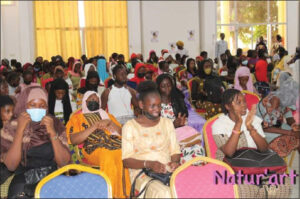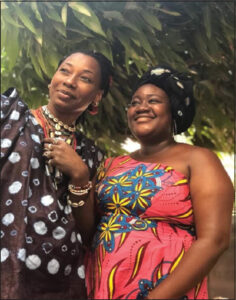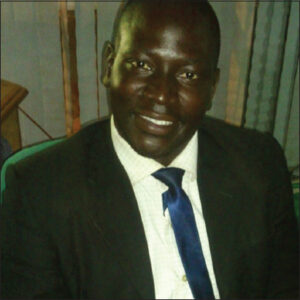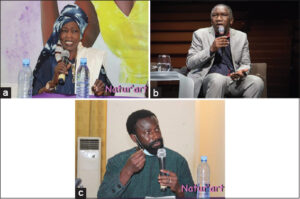Challenge of voluntary depigmentation in Mali: Natur’art engages in an awareness caravan against its harmful effects
Yamoussa Karabinta 1,2, Labassou Dissa1, Ténin Karambé1, Hawa Bagayoko3, Mikaila Kaboré5, Ousmane Sylla1,4, Abdoulaye Magané3, Koureissi Tall1, Binta Guindo1
1,2, Labassou Dissa1, Ténin Karambé1, Hawa Bagayoko3, Mikaila Kaboré5, Ousmane Sylla1,4, Abdoulaye Magané3, Koureissi Tall1, Binta Guindo1
1Teaching Hospital of Dermatologie, Bamako, Mali, 2Medical and Dental Faculty of Bamako, Mali, 3Conservatory of Arts and Crafts Balla Fassekè Kouyaté, Bamako, Mali, 4Central Directorate of Army Health Services, Bamako, Mali, 5Department of Infectious Diseases, Teaching Hospital of Point G, Mali
Citation tools:
Copyright information
© Our Dermatology Online 2024. No commercial re-use. See rights and permissions. Published by Our Dermatology Online.
ABSTRACT
Introduction: To commemorate March 8, 2023 (International Women’s Day), Natur’art engages in a vast caravan of awareness against the harmful effects of the act of depigmentation. Artificial depigmentation (AD) is the lightening of the skin using chemicals. The products employed are highly active corticosteroids, hydroquinone, as well as mercurial products such as soda. Artificial depigmentation is a practice that has emerged over the past three decades and has become one of the main reasons for dermatology consultations. In Mali, one in four women engages in depigmenting, and this phenomenon is not yet to stop as depigmentation products dominate the market.
Objective: The main objective of this project was to make African women aware of the dangers of this practice and to make them aware that beauty is plural through the enhancement of the natural integrity of the skin and hair.
Timeline of Activities: The awareness caravan on the harmful effects of artificial depigmentation was held at different places of the capital Bamako. The opening ceremony was held at the Bamako International Conference Centre (CICB) on Friday, March 26, 2023. The conference on the main theme followed by booth visits with the exhibition of artistic images of the skin of black African women and finally some high schools chosen on the basis of their high number of girls served as a place of awareness. The setup ended at about 8:10, and the actual ceremony began at 8:30. It was marked by three interventions. The first intervention was that of the Minister of Health and Public Health. The second was the presenter of Natur’art, Awa Bagayoko, who explained the initiative of the caravan, the innovative idea of Natur’art, consisting of preserving and enhancing the natural complexion of the African woman. There were a number of conferences about depigmentation.
Conclusion: This awareness-raising caravan, the first of its kind in Mali, served as a motor to intensify the fight against this harmful practice that devalues black African women.
Key words: voluntary depigmentation, awareness, harmful effffects, Mali
INTRODUCTION
Artificial depigmentation (AD) is the lightening of the skin using chemicals. The products used are highly active corticosteroids, hydroquinone, as well as mercurial products such as soda [1,2].
Artificial depigmentation, a practice that has emerged over the past three decades, has become one of the main reasons for dermatology consultations [1–3]. In Mali, one in four women engages in depigmentation, and this phenomenon is not yet to stop as depigmentation products dominate the market [3]. Ingredients used by the manufacturers of skin-lightening creams and soaps include mercury salts that prevent the formation of melanin, resulting in a lighter complexion [4]. Mercury is also found in other cosmetic products, such as eye cleansers. According to Professor Somita Keita, a dermatologist at the National Center for Support in the Fight against Disease (CNAM), says in an interview that when we prescribe pharmaceutical products that eliminate black spots on the bodies of women and they see that it has succeeded, they begin to use the product on the entire body, hence the need to educate potential candidates about the dangers of depigmentation. According to the WHO in a 2011 report, 25% of women in Mali regularly use skin-lightening products [3–5]. They represent 77% in Nigeria, 27% in Senegal, 35% in South Africa, and 59% in Togo [2,4–6]. In addition to mercury, depigmentants also contain toxic substances, such as hydroquinone and dermocorticoid, that weaken the immune system. The International Association for Information on Artificial Depigmentation (AIIDA) reports that 38% of skin cancers are favored by depigmentation [7]. The products used sometimes have effects that are difficult to treat or are untreatable [2]. Depigmentation is dangerous for health and causes diseases such as acne, stretch marks, and skin cancer. In pregnant or lactating women, the consequences of depigmentation are alarming [8,9]. It poses a risk of low birth weight, predisposition for the child to develop cardiovascular disorders, poor scarring after cesarean section in the mother, and cortico-dependence, says Dr Yamoussa Karabinta at a conference hosted by Cherifla TV. In Mali, patients divert products from their original use to make lightening products. As in other countries on the continent, including Senegal, South Africa, Togo, and Nigeria, Mali is affected by the phenomenon of depigmentation and hair straightening. In a 2011 report on Mercury in skin-lightening products, the WHO sounded the alarm about the health consequences of depigmentation [5]. How aware are Malian women of these dangers? Have they access to information about the dangers of using depigmenting and straightening products? What is the general view and opinion on the practice? Natur’art is a project of awareness and promotion of African beauty and femininity through artistic and cultural activities. It stresses the natural through complexion and hair to make women wonder about the consequences of using depigmentation products and to bring awareness to the danger that they incur to the skin. This caravan sets to change the mentality designed according to which the use of lightening and relaxing products would be a weapon of seduction and a sign of integration among women. Depigmentation is a practice used by many women to look beautiful to others. Today, women are at the heart of the debate on the issue of physical violence, verbal violence, demand for rights, and struggle for emancipation. At the international level, the month of March is declared Women’s Month and March 8 is celebrated through commemoration actions and advocacy for the improvement of women’s living conditions, both in cities or rural areas. In Mali, the month of the woman and the day of March 8 are generally celebrated through folklore demonstrations and adornments. Nowhere in the actions and speeches of the celebration of this month of women is mention made of the use of toxic products that seriously harm health. Natur’art by this caravan is committed to joining the struggle for the valorization of women, yet this time by emphasizing the need to address the question of the health of the woman, especially on behaviors and conceptions of beauty and social fulfillment. It is through this perspective that Natur’art, a traveling exhibition, awareness-raising skits, a panel of discussion on the dangers related to the use of depigmentation products, natural braid activities, fashion shows, photo exhibitions, documentary film screenings, testimonies and performances, raises awareness of the natural.
OVERALL OBJECTIVE
The main objective of the project was to make African women aware of the dangers of this practice and to make them aware that beauty is plural through the enhancement of the natural integrity of the skin and hair. Feeling “good in your own skin” means accepting yourself.
TIMELINE OF ACTIVITIES
Activity Spaces
The awareness caravan on the harmful effects of artificial depigmentation was held at different places of the capital Bamako. The opening ceremony was held at the Bamako International Conference Centre (CICB) on Friday, March 26, 2023. The conference on the main theme followed by booth visits with the exhibition of artistic images of the skin of black African women, and finally some high schools chosen on the basis of the high number of girls served as a place of awareness.
Duration of the Caravan
The caravan took place over the period from Friday 26 to Sunday 28 in March, 2023, for three days of full activity.
Target of the Caravan
The awareness-raising activity had two targets, a group of primary targets consisting of young girls, adult women, workers from the local socio-professional hair and cosmetics sectors, traditional practitioners and a group of secondary targets consisting of health authorities, local associations and NGOs fighting for women’s rights and empowerment, as well as technical and financial partners. The caravan was the initiative of Natur’art innovates, which offers numerous actions of marketing and communication, which will allow great visibility and strengthening of the notoriety in the juvenile population.
Opening Ceremonies
The setup ended at about 8:10, and the actual ceremony began at 8:30. There were a lot of young participants in the conference room (Fig. 1). It was marked by three interventions. The first intervention was that of the Minister of Health and Public Health. After a customary greeting, she placed the event in its context. She insisted on the importance of the caravan, which for her, must be a wise way to fight this scourge that destroys the true identity of African women. The African woman is distinguished by the beautiful color of her skin that she must preserve. She concluded by saying that she hopes that a significant number of young women will be made aware of the dangers of this harmful practice that ravages African society in general and Malian society in particular. This speech by the Minister was followed by that by the presenter of Natur’art, Awa Bagayoko (Fig. 2), who explained the initiative of the caravan, the innovative idea of this Natur’art project, which consists of preserving and enhancing the natural complexion of the African woman. She emphasized her commitment and that of her young team to lead this fight. She, then, thanked all partners for their technical and financial support for holding the caravan. Before concluding her speech, she conducted the caravan program. The last speech was by the Minister for the Promotion of Women, Children, and Families. She affirmed her full support for the young team engaged in such a difficult project. She gave a brief overview of the scourge that is becoming increasingly common in our societies. Before declaring the activities open, she said she was convinced of the success of the caravan.
Developments in Activities
March 26, 2023, was marked by a conference on the problem of depigmentation in Africa examined by Dr Yamoussa Karabinta (Fig. 3), Assistant Professor of Dermatology at the Medical Faculty of Bamako and Hospital Practitioner at the Dermatology Teaching Hospital of Bamako. Dr Karabinta defined voluntary depigmentation as a harmful, non-medical practice that lightens skin that is normally pigmented by the use of depigmenting products that may cause serious health problems. After defining the phenomenon, he spoke of the origin of the plague that are linked to the fear of being too black to the idea that the mixed or white complexion is more attractive than the dark black complexion. Some women think that the brighter your complexion, the better you are considered in society. He showed us figures in terms of the prevalence of voluntary depigmentation in sub-Saharan Africa to illustrate the scale of the problem. He cited the main depigmenting products in Africa, namely hydroquinones, mercurial derivatives, and dermocorticoids. As consequences of this practice, Dr Karabinta listed the occurrence of infections such as mycosis, furunculoses, acne, erysipelas, unsightly and irreversible wide stretch marks, scarring disorder, exogenous ochronosis, which are hyperpigmented spots appearing on photo-exposed areas and the occurrence of skin cancers which make all the severity of this practice. An iconographic projection ended the conference. After the conference, it was the artists of Natur’art through traveling exhibitions, awareness-raising skits, and fashion parades, photography exhibitions, screenings of a documentary film of testimony that occupied the rest of the day. The second day was devoted to awareness campaigns at high schools, faculties and large institutes to persuade women of the real danger that awaits them. A panel discussion on the dangers of using depigmentation products took place on the third day at the Modibo Keita Memorial. Dr Tall Koureissi and Dr Binta Guindo all dermatologists, Fatoumata Fc Coulibalibaly (Fig. 4a), Adama Traore (Fig. 4b), Alfousseyni Diallo (Fig. 4c), and Aminata Dramane Traoré, all from civil society took part in this panel to thoroughly dissect the subject. The debate was moderated by actor Abdoulaye Magan.
Closing Ceremony
She was marked by the intervention of the Minister of Health, who said he was reassured by the awareness of this devastating phenomenon, and she reaffirmed her commitment to accompany young people in this fight. The president of Natur’art, Awa Bakayoko, would like to expand this caravan to all regions of Mali.
Before closing the ceremony, the Minister for the Advancement of Women, Children, and Families, expressed his satisfaction and encouraged young people to continue this noble struggle.
CONCLUSION
Whatever the reasons, voluntary depigmentation has no health benefits. On the contrary, it is a source of countless dangers, including skin cancers. This awareness-raising caravan, the first of its kind in Mali, will serve as a motor to intensify the fight against the harmful practice that devalues African black women.
Statement of Human and Animal Rights
All the procedures followed were in accordance with the ethical standards of the responsible committee on human experimentation (institutional and national) and with the 2008 revision of the Declaration of Helsinki of 1975.
REFERENCES
1. MahéA, Ly F, GounongbéA. La dépigmentation cosmétique àDakar (Sénégal):facteurs socio-économiques et motivations individuelles. Sci Soc Santé. 2004;22:5-33.
2. Olumide YM, Akinkugbe AO, Altraide D, Mohammed T, Ahamefule N, Ayanlowo S, et al. Complications of chronic use of skin-lightening cosmetics. Int J Dermatol. 2008;47:344-53.
3. Faye O, Keita S, DiakitéFS, KonaréD, N´diaye HT. Side effects of depigmenting products in Bamako, Mali. Int J Dermatol. 2005;44suppl:35.
4. Wone I, Tal-Dia A, Diallo OF, Badiane M, TouréK, Diallo I. [Prevalence of the use of skin bleaching cosmetics in two areas in Dakar (Sénégal)]. Dakar Med. 2000;45:154-7.
5. OMS (2011). Guidance for identifying populations at risk from mercury exposure. World Health Organisation (hpptps:/www.who.int/foodsafety/publications/chem/mercuryexposure
6. Pitche P, Afanou A, Amanga Y, Changai-Walla T. Les pratiques cosmétiques dépigmentantes des femmes àLomé(Togo). Med Afrique Noire. 1998;45:710.
7. Association Internationale d’Information sur la dépigmentation Artificielle(AIIDA). https/www.leral.net/Association-Internationale-d-Information-sur-Deoigmentation-Articielle_a55289. 12 Septembre 2012
8. Mugisho NP. Pratique de la dépigmentation volontaire de la peau noire àBruxelles:prévalences, facteurs associés et effets sur la santé. Ve congrès international d´épidémiologie Bruxelles:7-15.
9. Morand JJ, Ly F, Lightburn E, MahéA. [Complications of cosmetic skin bleaching in Africa]. Med Trop (Mars). 2007;67:627-34.
Notes
Request permissions
If you wish to reuse any or all of this article please use the e-mail (brzezoo77@yahoo.com) to contact with publisher.
| Related Articles | Search Authors in |
|
 http://orcid.org/0000-0001-7872-7937 http://orcid.org/0000-0001-7872-7937 http://orcid.org/0000-0003-0385-5832 http://orcid.org/0000-0003-0385-5832 http://orcid.org/0009-0003-3481-0968 http://orcid.org/0009-0003-3481-0968 |








Comments are closed.